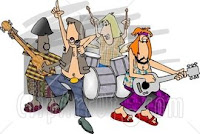

A half-starved wolf was jealous of a dog who appeared to be well-fed, fat, and strong. “Come to our house,” the dog said to him. “You’ll find everything to eat there.”
The wolf was very happy and started to go home with the dog. On the way, however, he noticed something on the dog’s neck. “What’s that?”
“Nothing much,” answered the dog. “It’s only the mark of my chain.”
“Your chain? Does that mean your master ties you up?” And with these words, the wolf ran away. He thought to himself that he’d rather be hungry than (be) without liberty.
A.COMPREHENSION
a. Why did the wolf prefer to remain hungry? Choose the correct answer.
1. He didn’t like meat.
2. The dog wouldn’t share his food with him.
3. He preferred to be free.
4. The house was too far.
5. The wolf was tied.
b. Answer these questions in complete sentences.
1. Who was jealous of the dog?_ __________________________________________
2. Why was the wolf jealous?_ ______________________________________________
3. Where did the dog invite the wolf to go?_____________________________________
4.What did the wolf notice?_________________________________________________
5.Why did the dog have the mark of a chain around his neck?
________________________________________________________________________
B VOCABULARY
a. Read the story again and find the synonyms for these words:
1. envious ______________________________
2. seemed ______________________________
3. pleased ______________________________
4. began ______________________________
5. observed ______________________________
6. hungry ______________________________
7. fat ______________________________
8. preferred ______________________________
b. Match the words from Column 1 with their antonyms in Column 2 (Draw a line.)
What part of speech are these words?
hungry everything (noun)
thin without ( __________________)
weak well-fed ( __________________)
nothing chained up ( __________________)
sad ran away ( __________________)
a lot fat ( __________________)
loose happy ( __________________)
with not much ( __________________)
came home strong ( __________________)
free tight ( __________________)
c. hyphenated adjectives use a hyphen between two or three adjectives describing a noun. For example: a. Sometimes I eat hard-boiled eggs for breakfast.
b. I have two five-dollar bills.
c. I work in a ten-story building.
d. They are very well-fed men.
In the story, please find the hyphenated adjectives.
e. ______________________
a. ______________________
C. GRAMMAR
A half-starved wolf was jealous of a dog who appeared to be well-fed, fat, and strong.
WHO clauses (a clause is a group of words with a subject + verb)
Examples: a. Sally is the one who teaches at the Chinatown Campus.
WHO refers to ONE, so teaches is singular.
b. Sally and Mary are the ONES who teach at eh Chinatown Campus.
WHO refers to ONES, so teach is plural.
c. He is the man who (own, owns) the restaurant.
WHO refers to ___________ , so ___________ is the verb.
d. Her children, who (go, goes) to elementary school, (studies, study) very hard.
WHO refers to _______________, so _______________ is the verb.
CHILDREN is the subject, so ________________ is the verb.
WHO is the subject of a clause BUT cannot stand alone (unless it is a question).
Please write your own sentence using WHO to introduce a clause. (DO NOT WRITE A QUESTION.)
e. _________________________________________________________________
DIRECT and REPORTED SPEECH
DIRECT (QUOTED) SPEECH to INDIRECT (REPORTED)SPEECH
1. He said, (He told me/ her/ him/us/them),“I work hard.” He said that he worked hard.
2. He said, “I worked hard.” He said that he had worked hard. 3. He said, “I will work hard.” He said that he would work hard.
4. He said, “Work hard.” He told me to work hard.
5. He asked, “What’s your name?” He asked me what my name was.
Change the direct speech sentences to indirect speech.
1. “Come to our house,” the dog said to him.
____________________________________________________
2. “You’ll find everything to eat there.”
______________________________________________________________________
3. “What’s that?”
______________________________________________________________________
4.“Nothing much,” answered the dog.
______________________________________________________________________
5.“It’s only the mark of my chain.”
______________________________________________________________________
6.“Your chain?
______________________________________________________________________
7.Does that mean your master ties you up?”
______________________________________________________________________
WOULD RATHER + verb
Examples: a. He’d rather be hungry than (be) without liberty.
b. I would rather eat bread than (eat) rice.
c. My mother would rather live in L.A. than move to San Francisco.
Please write two sentences using this grammar form.
1._____________________________________________________________________
2. _____________________________________________________________________
CONVERSATION
First talk to your partner. Then write your own answers.
1. Why do you think the wolf preferred to be free rather than get food at the dog’s house?
________________________________________________________________________________________________________________________________________________
2. What does “liberty” mean to you?
________________________________________________________________________________________________________________________________________________________________________________________________________________________________________________________________________________________________







